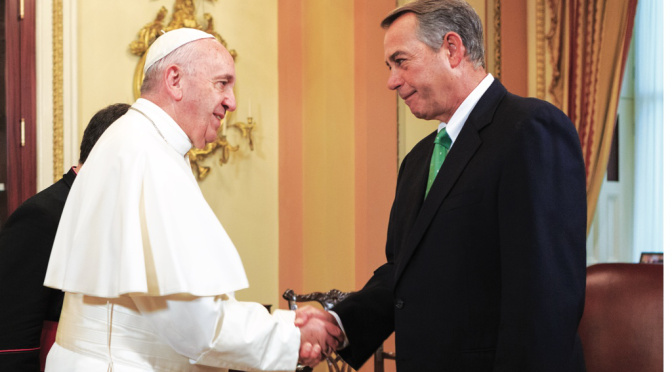In the wake of Pope Francis’ recent visit to the United States, the biggest question following him in the media is where his opinions fall on the political spectrum. It is not entirely surprising that his visit sparked a critical analysis of his stance on social and political issues. He is after all labeled as an unusually progressive figurehead for a faith increasingly at odds with certain values of contemporary society. Francis is a pope, not a politician, and his opinions should be evaluated for their own merit, rather than their meaning in terms of political debates.
While Pope Francis’ speech to Congress undoubtedly added a political element to his visit, the polarized American political system naturally sets the stage for a guessing game of individuals’ political agendas, including the pope. But as was shown during his visit, where he made both right-leaning anti-abortion and same-sex marriage comments, as well as left-leaning pro-immigration and environmental action statements, the first mistake is in assuming Pope Francis had a political agenda to begin with. Forcing a relationship between the pope and the political spectrum serves only to separate Pope Francis as a figurehead from Catholicism as an institution—at the end of the day, he is first and foremost a Catholic and his opinions on political issues ultimately stem from this identity.
Pope Francis’ general message of empowerment, equality and acceptance of all, to a degree, has generated hope in many Catholics and non-Catholics alike for him to be the person finally capable of reforming the controversy, corruption, and outdated conservatism of the Catholic Church. His excellent public image has allowed him to transcend the categorization as a purely religious leader, and prompted consideration of his ability to act as more of a global spiritual leader. He preaches acceptance and love of all faiths and races, and advocates for the powerless; but perhaps his inspirational image has created too much optimism for his ability to fill a political role.
Despite his progressive image, his sidestepping of sensitive issues in his most recent string of speeches should not be overlooked. For example, his acknowledgement of the enormous sexual abuse scandals, denied and misconstrued by the Church for years, conveniently took a backseat to other topics. When Pope Francis did mention them, he did so in a classic display of Vatican inability to face an issue straightforwardly: Through a string of euphemisms and praise to bishops for showing “courage,” rather than focusing on the trauma of the actual victims themselves.
If people are searching for universal, spiritual leadership in Pope Francis they may find elements of it in his advocacy for equality and love, but ultimately he represents the white male-dominated institution of Catholicism and his opinions are inseparable from this. Trying to place him on the political spectrum skews the meanings of his opinions and obscures their origin. By politicizing Francis’ words, commentators forget what it means to be a pope and analyze him completely out of context.
For a nation founded on the separation of church and state, an ironically large amount of U.S. media coverage was devoted to figuring out how the two come together in Pope Francis. It is credit to his excellent public relations abilities that society sees him as analyzable purely in terms of politics, separate from the religious institution he represents.
People can admire his quest to bring a universal, apolitical message of love, equality, and acceptance to a country so polarized in political discourse and wealth distribution, but cannot ignore where he comes from. What impact he will have on the stubborn rigidity of the Catholic Church remains to be seen, but futile attempts to ground him on a political spectrum are irrelevant in evaluating his contribution to Catholicism and to the wider world.








